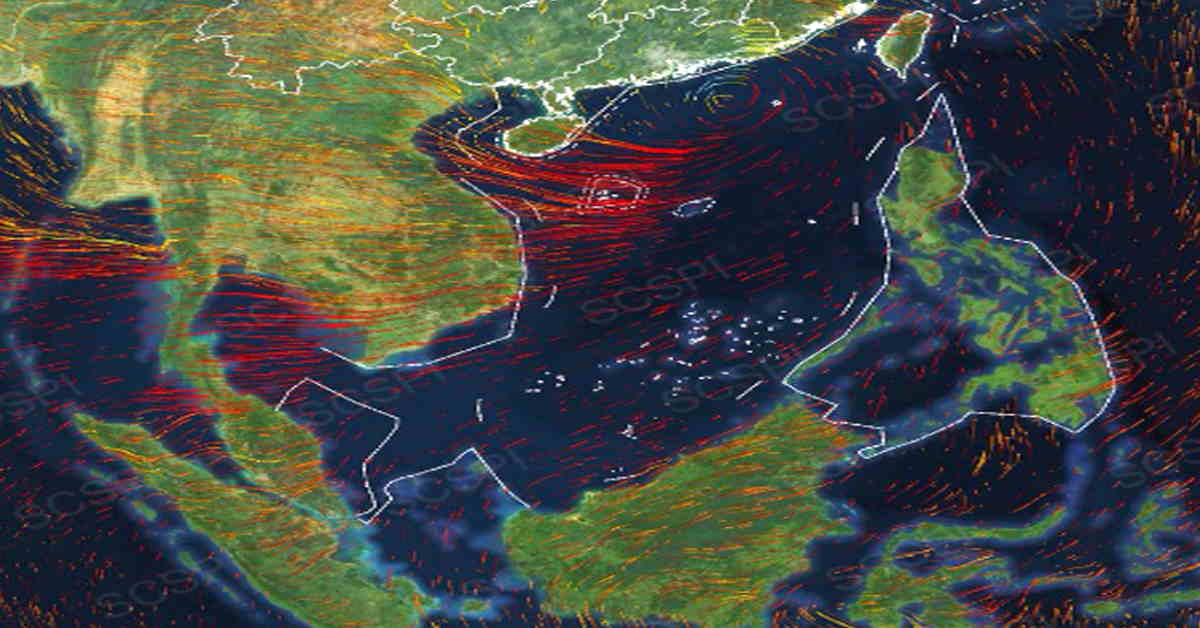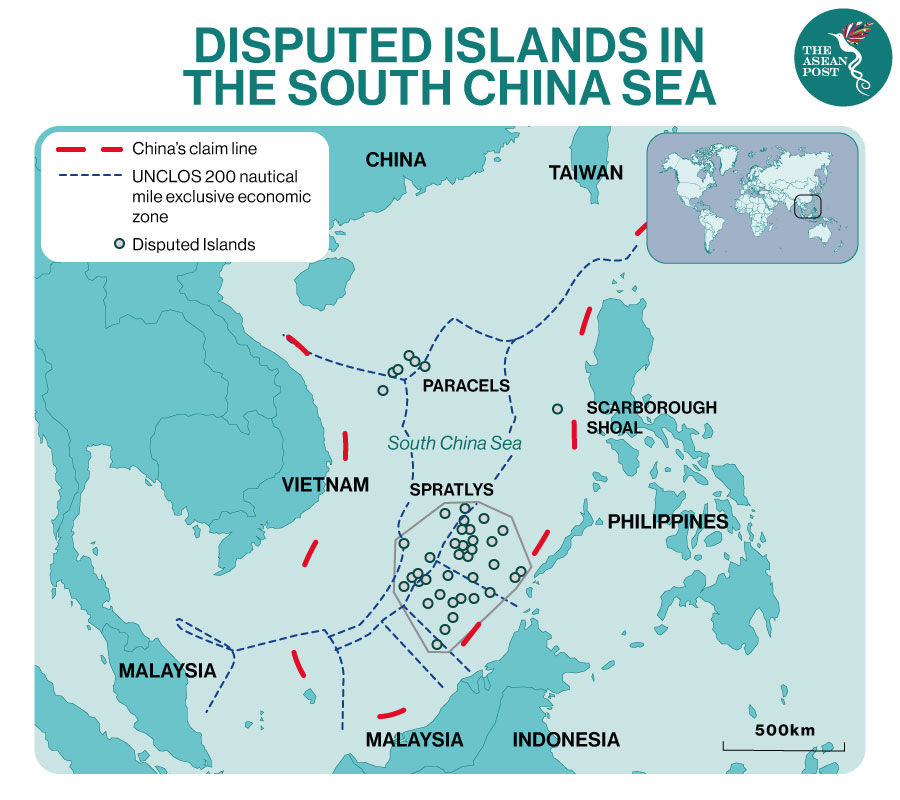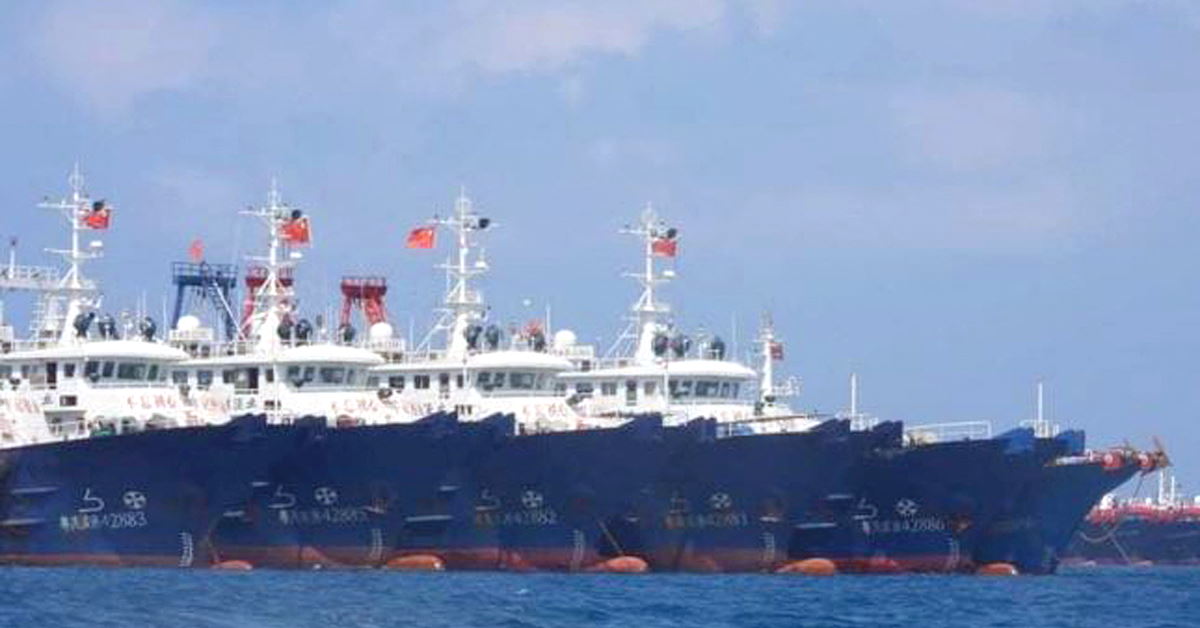The recent skirmish in the South China Sea (SCS) between the Philippines and China that some personalities belonging to the political opposition coined as a prelude to the Chinese invasion of the Philippines is a far-fetched, and exaggerated way of describing the incident.
It can be recalled that in early March, around 200 Chinese fishing vessels were spotted anchored at Whitsun Reef, a disputed territory in the South China Sea (SCS), which had flickered apprehensions and anxieties in the Philippines.
The Whitsun Reef, also known as the Julian Felipe Reef, is a reef at the northeast extreme limit of the Union Banks in the Spratly Islands of the South China Sea. It is the largest reef of the Union Banks, located at the heart of the disputed Spratly Islands. The Philippines has its claims on the said reef.
As a reaction, the Department of Foreign Affairs (DFA) lodged a note verbale protesting the "unauthorised and lingering" presence of Chinese ships in and around the reef.
The Philippines demanded China to "promptly withdraw" its fishing vessels near the features in Kalayaan Island Group (KIG) or Spratlys asserting its claim on the Julian Felipe Reef as part of the country’s Exclusive Economic Zone (EEZ).
"We reiterate that the continued deployment, lingering presence, and activities of Chinese vessels in Philippine maritime zones blatantly infringe upon Philippine sovereignty, sovereign rights, and jurisdiction," it said.
Chinese Response
On the other hand, the Chinese Ambassador to the Philippines Huang Xilian on Wednesday (24 March) explained that the flock of Chinese fishing boats highlighted in the Philippines' latest diplomatic protest was only "taking shelter" in the waters off Julian Felipe Reef which is within the Philippines’ EEZ.
"As [what] we issued the day before yesterday, Chinese fishing vessels have been fishing in the area for many, many years, now those vessels are taking shelter in the part of that sea, I think it's a quite normal activity," Huang said in an interview.
He further contended by saying, "There were no such militia vessels as claimed by some people, any speculation is not helping."
It can be recalled that the Spokesperson of the Chinese Embassy in the Philippines issued a statement on the Presence of Alleged Chinese Maritime Militia Vessels at Niu’e Jiao on 22 March (Monday) stating that, “The Chinese Embassy has taken note of the recent statement and remarks of the Philippine side on the presence of alleged Chinese Maritime Militia Vessels at Niu’e Jiao.
Niu’e Jiao is a part of China’s Nansha Qundao. Chinese fishing vessels have been fishing in its adjacent waters for many years. Recently, some Chinese fishing vessels took shelter near Niu’e Jiao due to rough sea conditions. It has been a normal practice for Chinese fishing vessels to take shelter there under such circumstances.
There is no Chinese Maritime Militia as alleged. Any such speculation only causes unnecessary irritation. It is hoped that the situation could be handled in an objective and rational manner.”
To note, Beijing and Chinese officials have not denied but rather acknowledged the presence of fishing vessels and pointed out that these Chinese fishing boats have been sheltering from the wind near the Whitsun Reef because of bad weather and sea conditions in the area. Foreign ministry spokeswoman Hua Chunying told reporters: “We believe this is very normal, and hope all parties can consider it rationally.”
Based on information from the National Oceanic and Atmospheric Administration (NOAA), an American scientific agency within the United States (US) Department of Commerce that focuses on the conditions of the oceans, major waterways, and the atmosphere in Washington D C, the wind data a week ago from the NOAA Operational Model Archive and Distribution System, indicates that the weather was really bad (see below), where the colour red connotes the highest wind speeds.

Moreover, on 24 March as part of the trust/confidence-building measure to ease tensions created by the recent skirmish between the two countries over the disputed SCS, representatives of the Philippine military met with their Chinese counterparts to convey Manila’s demand that the ships leave Whitsun Reef in the Spratly Islands, Armed Forces of the Philippines (AFP) spokesperson Major General Edgardo Arevalo said in a statement.
In the meeting, Chinese military representatives “reiterated their government’s assurance” that the boats were not militia but fishing boats taking shelter near the reef because of inclement weather,” Arrivalo said.
Context
The recent incident in the contested waters of the SCS between China and the Philippines is not something new and most definitely is not a prelude to an invasion or occupation of the Philippines by China as claimed by some parties. To say that it’s a prelude to an occupation or something to that effect is too far-fetched and a deliberate attempt to blow the issue out of proportion.
The Union Banks where the Whitsun Reef is situated is thus far being claimed by three countries China, Vietnam, and the Philippines; which explains why Vietnam also complained of the presence of Chinese fishing vessels in the reef. Just like the Philippines and China, Vietnam also claims sovereignty on the said disputed area of the SCS.
Vietnam’s Foreign Ministry spokesman, Le Thi Thu Hang said in a statement that the presence of nearly 200 Chinese militia and fishing vessels in the reef, where it has overlapping claims with the Philippines, is a serious violation of Vietnam’s sovereignty. Hang said that “It must be reiterated that Vietnam has sufficient legal basis and historical evidence to assert its sovereignty over the Spratly Islands in line with international law.”
Perspective
To file a note verbale as an act of protest to the recent skirmish in the disputed SCS between the Philippines and China is expected on the part of DFA.
Nonetheless, on the part of the Philippine government and the security forces, these kinds of incidents in the disputed SCS should be handled in a rational, objective, and level-headed manner to prevent unnecessary irritation and antagonism that might lead to any forceful confrontation with China of which the Philippines is not equipped and prepared for.

Hence, the Philippine government and concerned officials must be more discerning, cautious, and wiser in how they approach matters in this regard. Given the deepening and blossoming friendship between the Philippines and China, differences between the two countries must be addressed and resolved through diplomacy, bilateral talks, and friendly negotiations.
Filipinos should also refrain from speculations and look at the wider geopolitical picture of the disputed waters of the SCS vis-à-vis the interests of the western powers and the Pivot to Asia policy of the US to contain and prevent the rise of China. One must not forget that China is a rising contender in the contest for supremacy in the SCS, in Asia, and around the globe. This reality is what the US has been trying to prevent for some time now by hastening its confrontation with China on all fronts.
Nevertheless, as long as rival claimants of the disputed SCS like the Philippines exercise restraint and approach the dispute or any skirmishes for that matter rationally, the risk of military conflict can be minimised. Likewise, as long as there are no maritime military clashes between rival claimants in the SCS, the US and its allies will have no reason or justification whatsoever to step in and intervene, thus a direct military confrontation between China and the US can be avoided.
The Philippines must avoid at all costs becoming a “dangerous flashpoint” in the conflict between the two superpowers as it is not in the country’s best interests. Hence, the Philippines should heed the call of personalities like Brigadier General Victor Navarro Corpus, former chief of the Intelligence Service of the Armed Forces of the Philippines (ISAFP) who said that “countries like the Philippines should get out of the way! It is not in the country’s national interest to serve as cannon fodder for either superpower.”
Conclusion
Hence, in resolving differences, China and the Philippines should be more objective, level-headed, and rational in their approach. They should resolve their differences in a peaceful, diplomatic, and friendly manner.
On the part of the Philippines, diplomacy and independent foreign policy are the most effective tools available to the Duterte administration as the country pursues its bilateral relations with China, the US, and the rest of the world.
Related Articles:

